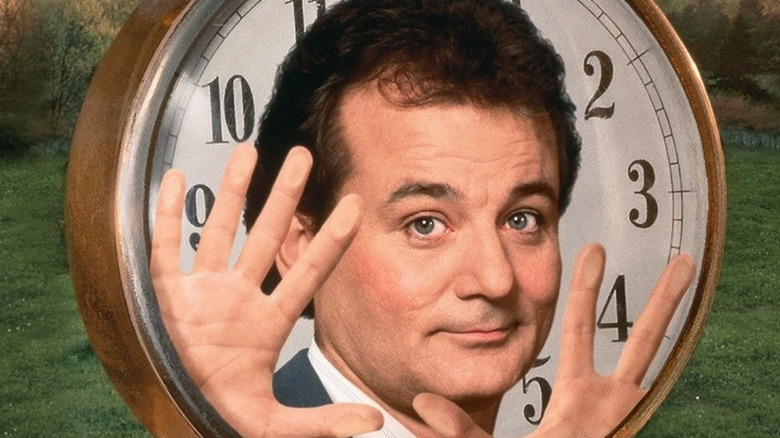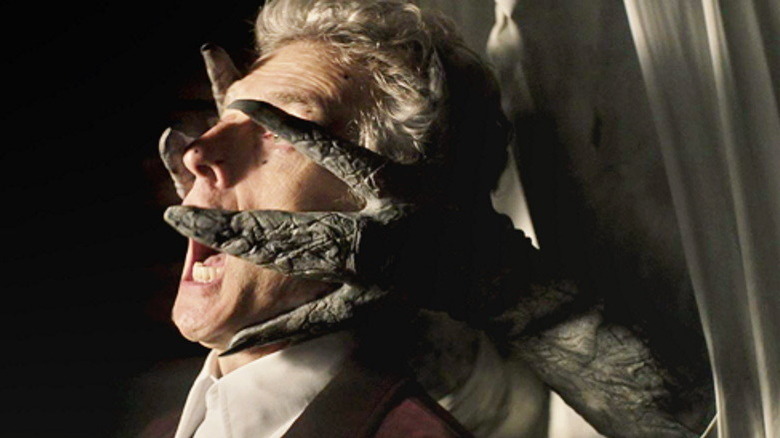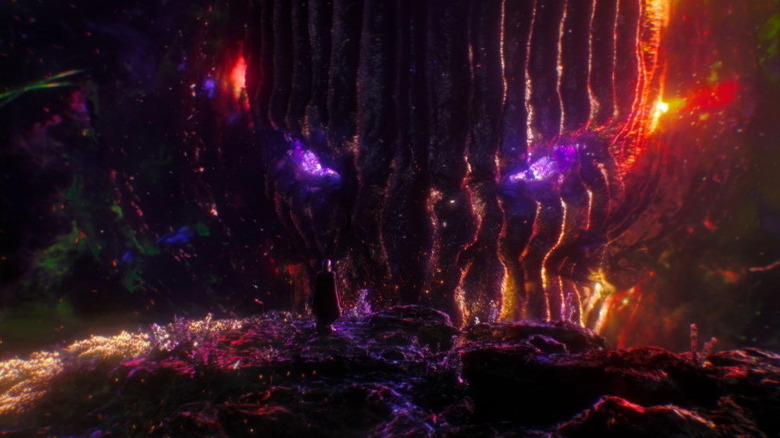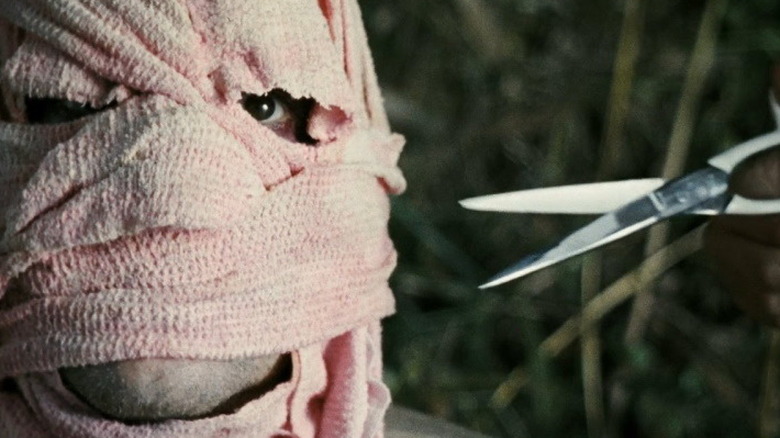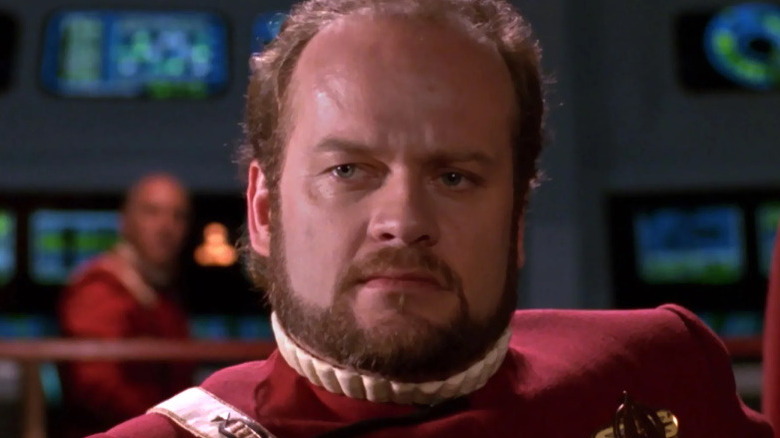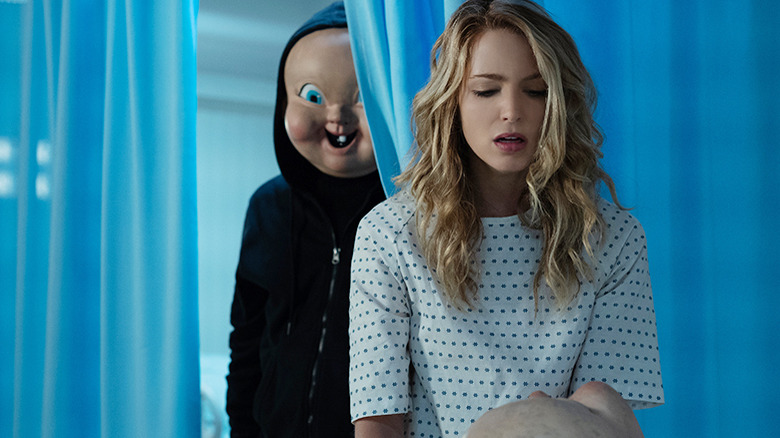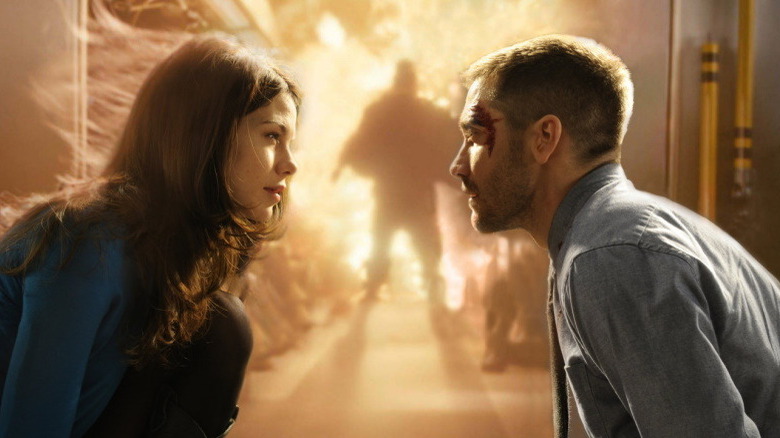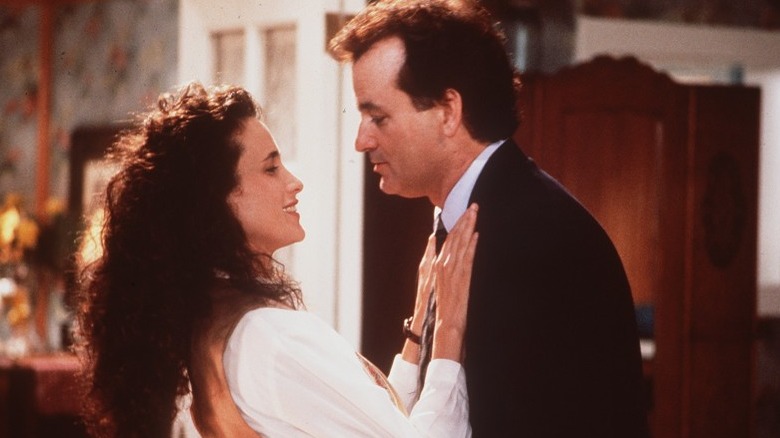Time Loops In Movies And TV Shows Ranked Worst To Best
It's a trope that has been used again and again (and again) in movies and TV episodes — the infamous time loop. What starts out as a normal day quickly morphs into a very abnormal series of days as you find yourself re-experiencing the same period of time, possibly for all eternity. People greet you with identical lines, random events become daily expectations, and déjà vu is now your way of life.
How you get stuck in one of these repeating time spans can vary. Maybe you ran afoul of some pesky alien anomaly. Maybe you volunteered for a mad scientist's experiment. Or maybe there is no explanation and you just have to chalk up your endlessly repeating day to a demonic prank or divine intervention.
Therein lies the question — are time loops purgatory or paradise? As with many things, it depends on the moment you're trapped in and who you get to share it with. So, while some of the people on this list may want nothing more than to escape from their temporal prison, a few actually enjoy their endless series of good days — to the point where they become the gods of their personal day.
If you love revisiting your favorite reruns, get ready for some serious timey-wimey, wibbly-wobbly hijinks. Below are classic time loops in movies and TV shows, ranked from the one you'd least like to be stuck in to those that wouldn't be half bad.
Doctor Who
The Doctor has run afoul of time loops in many episodes of the long-running "Doctor Who" franchise. However, one of the worst time loops he had to endure occurred in the ninth series' episode "Heaven Sent," which found the 12th Doctor (Peter Capaldi) trapped in a time loop he likened to hell or, as he put it, "Heaven for bad people."
After going against his people, the Time Lords, the episode has the Doctor teleported into an empty castle trapped within a glass chamber. An exploration of the premises reveals the castle is filled with skulls, discarded clothes, and a shrouded, slow-moving figure trying to interrogate him. To his horror, the Doctor realizes that he's stuck in a time loop and the skulls all belong to him — the remnants of old bodies mortally wounded by his shrouded companion.
To survive, the Doctor uses a teleportation chamber to create a copy of himself every time he's near death. Since there's no power, he incinerates his own body to jumpstart the process and leaves clues so his new self knows what to do. After punching repeatedly at the glass wall of his chamber, he finally breaks through ... 4.5 billion years after he first got stuck inside.
Regarded as one of the best "Doctor Who" episodes, "Heaven Sent" gives new meaning to the term "time loop torture." Other time loop prisoners may feel like they've spent an eternity in their causal loops, but the Doctor likely has them all beat.
Loki
The Time Variance Authority (TVA) in the Disney+ series "Loki" sure knows how to weaponize time. In the first episode, TVA Agent Hunter B-15 (Wunmi Mosaku) strikes Loki with her baton, causing him to slow down to one sixteenth of his speed — but experience the pain of her blow in real time. Later, the TVA uses a "Time Twister" that snaps him back to a previous position when he tries to escape.
But by far the worst TVA torture device is their time loop prison. In "The Nexus Event," Agent Mobius (Owen Wilson) throws Loki into a time loop that makes him re-experience an event where Lady Sif (Jaimie Alexander) slaps him, knees him in the groin, and punches him in the face in retaliation for cutting off her hair. Cruelest of all, however, are Sif's words to Loki:
"I hope you know you deserve to be alone, and you always will be."
Loki tries to brush it off — but when Sif re-appears again ... and again ... and again to deliver the same punishment and cutting words he realizes this is no laughing matter. By the time Mobius comes back for Loki, the God of Mischief has been battered multiple times — and then Mobius throws him back into the time loop for a few thousand more rounds. Ultimately, the torture breaks Loki and he apologizes to Sif — showing the time loop may have hurt him worse than when the Hulk smashed the "puny god" in "The Avengers" (2009).
Doctor Strange
Time is a recurring theme in "Doctor Strange" (2016). Stephen Strange (Benedict Cumberbatch) collects expensive timepieces. He orders a fellow doctor to cover his watch when it distracts him during surgery. He even holds onto a single broken watch given to him by his former lover Christine (Rachel McAdams, herself a veteran of time travel movies like "The Time Traveler's Wife" (2009) and "About Time" (2013)).
All of this reveals Strange's obsession with controlling something that can't be controlled — time. But after injuring his hands and studying at the mystic school of Kamar-Taj, Strange is told by his teacher the Ancient One (Tilda Swinton) that to reach his fullest potential, he needs to let go of his need for control in order to gain better control of chaotic situations.
None of this makes sense to Strange — until he comes face-to-face with Dormammu (also played by Cumberbatch), a demonic being who exists in a dimension outside of time. Seeing an opportunity, Strange casts a spell that traps the two of them in a time loop where Dormammu can torture and kill Strange endlessly ... but can't escape the loop or his enemy's meme-worthy introduction:
"Dormammu! I've come to bargain."
Ultimately, the prospect of torturing Strange for eternity loses its appeal and Dormammu rage-quits, agreeing to leave Earth if Strange releases him. While the time loop was torture for Strange, it was arguably worse for Dormammu. Having Strange as your eternal roommate is its own form of hell.
Timecrimes
"Timecrimes" (2007) is a Spanish time loop film with a twist — although the protagonist Héctor (Karra Elejalde) is stuck in a causal loop, he intentionally keeps reliving the same day and screws up his life more and more.
At first, it seems Héctor is the unfortunate victim of a plot against him. After finding a naked and unconscious woman in a forest, he gets stabbed in the arm by a man with a bandaged face and is forced to flee. Seeking a place to hide, he finds a laboratory with a time machine and accidentally travels back an hour where he lives the day's events again ... only to find himself becoming the man who attacked the woman, stabbed his past self, and later killed his wife. As if this wasn't bad enough, Héctor travels back through the same time loop again to prevent his wife's death — and just ends up committing even more crimes.
A low budget thriller with a smart script and tense acting performances, "Timecrimes" explores the dark side of predestination. Héctor might appear to be an innocent dupe at first, but thanks to time travel he becomes his own worst enemy.
Star Trek: The Next Generation
The "Star Trek" franchise plays a lot with time travel, and various crews regularly find themselves wandering through the Great Depression ("Star Trek" Season 1's "The City on the Edge of Forever") or becoming the aliens involved in the Roswell UFO incident ("DS9" Season 4's "Little Green Men").
However, the "Star Trek: The Next Generation" Season 5 episode "Cause and Effect" uses time travel in a very different way. After colliding with a starship emerging from a spatial anomaly, the entire crew of the Enterprise gets shunted into a time loop where they keep reliving the events of the day with no knowledge that they're trapped in a temporal prison. Fortunately, feelings of déjà vu eventually allow the crew to figure out what happened and they send a clue through the time loop to break the destructive pattern.
All of this plays out like a standard adventure for the U.S.S. Enterprise, who discovered they were only out of commission for just over two weeks. Unfortunately, the crew of the ship they kept colliding with — the U.S.S. Bozeman — isn't nearly as lucky when their captain (Kelsey Grammar) discovers they've been unknowingly trapped for over 90 years. Talk about putting in major overtime...
Happy Death Day
Getting to relive your birthday over and over again might sound like fun — unless you get murdered every night like college student Theresa "Tree" Gelbman (Jessica Rothe) in "Happy Death Day" (2017). Thanks to some unexplained phenomena, Tree is stuck in a time loop that subjects her to repeated killings from a murderer dressed like the school mascot.
Taking advantage of the immortality provided by her loop, Tree tries to uncover her killer's identity so she can take him out before he murders her. Unfortunately, as any horror fan can tell you, finding a masked murderer isn't easy, and Tree has to endure a lot of death days before the time loop ends.
... Only for it to restart in the sequel "Happy Death Day 2U." This time, we get a science fiction explanation for the time loops and Tree is shunted into an alternate reality where events play out very differently, necessitating a lot of additional death scenes. Who knew slasher victims could be so easily recycled?
Edge of Tomorrow
Also marketed as "Live Die Repeat" (2014), "Edge of Tomorrow" is a Tom Cruise action movie that shows the benefits and drawbacks of getting doused with alien blood. Cruise plays Major William Cage, a media relations man with no combat experience forced to join a bunch of soldiers on an assault against an alien army called the "Mimics." The assault fails and Cage gets covered in alien blood before he's killed ... but then he wakes up to find the day's events are repeating themselves.
Using his repeated experiences to navigate safely across the battlefield, Cage makes contact with Sergeant Rita Vrataski (Emily Blunt), a woman who used a similar time loop to win a victory for the humans until a blood transfusion robbed her of the ability. Taking advantage of Cage's time loop, Vrataski trains him to locate and kill the aliens' Omega control. Of course, Cage fails — repeatedly — but he manages to use his experiences to connect with Vrataski and his military unit, and eventually come up with a way to beat the Mimics.
While this is clearly a terrible time loop to be stuck in, Cage makes the most of a bad situation — even taking a "break" during some loops to get drunk as the world burns around him. It might be a blasé attitude to develop, but after a few thousand rounds of alien battles, it's also understandable.
Boss Level
When you think about it, time loops are a lot like video games. After playing the same game multiple times, you can anticipate your opponents' attacks, develop countermeasures, and level up. As it turns out, retired special forces soldier Roy Pulver (Frank Grillo) needs to do just that in "Boss Level" (2021) when he gets trapped in a time loop that plays out like a game of "Grand Theft Auto."
After becoming the subject of a time travel experiment performed by his estranged wife Jemma (Naomi Watts), Roy wakes up every morning attacked by assassins. While they manage to kill him the many, many times, Roy learns from each murder attempt until he's able to outfight his attackers. Unfortunately, more assassins keep coming and Roy can't survive a final attack at 12:47 PM.
It's not all bad for Roy, though. During the periods where he isn't being hunted, he reconnects with his son by playing video games. Their time together motivates him to learn how to take down his tougher opponents, and he finally reaches the "boss level" where he faces off against the mastermind behind the attacks, Colonel Clive Ventor (Mel Gibson).
Best known for his role as Captain America's enemy Crossbones/Brock Rumlow in the MCU movies, Grillo gets to channel his inner superhero for "Boss Level." At one point, after fighting assassins for years, he even delivers Steve Rogers' famous line, "I can do this all day." Well, yes. Yes, he can.
Source Code
Time loops can be terrible things to be stuck in — but for the protagonist of "Source Code" (2011), what waits for him outside the loop is more horrifying. Waking up in a commuter train going to Chicago, U.S. Army Captain Colter Stevens (Jake Gyllenhaal) can't remember how he got there. Before he can piece everything together with his new friend Christina (Michelle Monaghan), the train explodes, killing everyone.
Of course, the scenario resets — but this time there's a twist. Just before the new loop begins, Stevens wakes up in a cockpit and is informed by an Air Force captain that he's being put through simulations to find the train bomber before the train blows up. At first, Stevens cooperates, but over time he becomes suspicious and learns he's in the "Source Code," an experimental machine that reconstructs past events. To his horror, he learns he was killed in a separate incident months ago and his brain is connected to the machine, essentially making him an unwilling pawn in a military experiment.
Still, Stevens continues his missions and eventually finds the information his handlers want. Knowing what's in store for him if the scientists keep him alive, he asks to be taken off life support — and gets to experience one more time loop where he stops the bomber and lives a full healthy life in an alternate reality. It's a weird ending, but at least Stevens doesn't have to stay a lab rat.
If Only
Most time loop movies fall squarely in the science fiction or fantasy genre. However, there are also a surprisingly large number that are love stories.
It makes sense, really. After all, what better way is there to show your devotion to your significant other than to find happiness living with them forever? Unfortunately, while some romantic time loop films offer happy endings, a few still result in bittersweet tragedies.
"If Only" (2004) follows Ian (Paul Nicholls) and Samantha (Jennifer Love Hewitt), a young couple with problems. Although Ian loves Samantha, his cold behavior alienates her from him and she leaves him, climbing into a taxi seconds before it gets into a fatal car accident. Heartbroken, Ian goes to bed and wakes up to find Samantha is still alive and the events of the previous day are repeating themselves.
Feeling he has a second chance to save Samantha, Ian tries to get her out of town — but finds that although he can change some things, key moments from the day will still repeat themselves in different and unpredictable ways. Deciding the best thing he can do for Samantha is to show her how much he loves her; Ian decides to give her an amazing final day before making a heartbreaking final choice. In the end, we learn that you can't fight fate ... but that doesn't mean you can't change it.
Groundhog Day
How could we forget about the ultimate time loop movie? Starring Bill Murray as Phil Connors, a television weatherman who gets stuck repeating the same winter's day while covering an annual Groundhog Day event in Punxsutawney, Pennsylvania, "Groundhog Day" (1993) is famous for exploring all the possibilities of living in a time loop.
At first, Phil sees his endless day as torment. Then he starts enjoying the guilt-free pleasures that come with living a life without consequences. After this gets too boring, he tries to end it all. When that doesn't take, he embarks on a period of self-improvement, and ultimately finds a way to connect with the entire town and his producer Rita (Andie McDowell).
No explanation is provided for Phil's time loop and we don't really need one — the movie's journey is the point of the story, not how we got there. Phil's actions and attitude allow his time loop to become both heaven and hell, showing that, in the end, it's our mindset that truly determines how we live.
Palm Springs
One of the saddest things about being stuck in a time loop is the feeling that nothing you do matters. Since your day constantly resets, any connections you make with others will be undone, leaving you back at square one.
But what if this wasn't the case? What if you got to spend your eternal day with someone who made you smile every time you woke up?
That's what the Hulu film "Palm Springs" (2020) explores when Nyles (Andy Samberg) finds himself trapped ... in a really good day. While attending a wedding at Palm Springs, Nyles wanders into a cave that sticks him in a time loop, letting him repeat the wedding day and live a life of hedonistic pleasure. Many days later, Sarah (Cristin Miloti), a beautiful wedding guest, wanders into the same loop and becomes Nyles' partner-in-crime. The two engage in goofy hijinks, play with their immortality, and eventually fall in love. But even immortals get tired of eternity, and after countless more days, Nyles must decide whether to risk escaping the loop with Sarah.
What's unique about "Palm Springs" is that Nyles genuinely doesn't want to leave his time loop, which offers him the security of predictability. Even Roy (J.K. Simmons), a man Nyles accidentally trapped in the loop, admits they're stuck in a nice day. Time loops have their disadvantages — but if you get to spend eternity with your soul mate, they can make nice stopovers.
